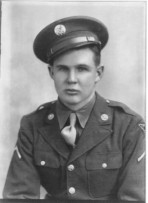I'd seen that picture of the handsome young soldier so many times that I assumed soldiering was an experience my father remembered fondly. It wasn't until after he died that I learned that Dad, during what remained of his 73 years after his discharge, never quite reconciled it all with the Army.
It was true that he didn't talk of it much, but no one did, probably because it was something they all went through together and there was no need to rehash what they already knew.
He let me take his French francs and Deutsche marks to school for show-and-tell and he taught me to say a few French phrases. Dad had been to France and other parts of Europe. Even if it had been to fight a war, the experience made him cosmopolitan and worldly in the eyes of a 7-year-old kid whose universe was fairly well limited to a 250-acre farm. I don't recall exactly, but recalling that I was sure I was named after Elizabeth Taylor, it's a safe bet that I made him sound like Audie Murphy's understudy.
I don't recall exactly, but recalling that I was sure I was named after Elizabeth Taylor, it's a safe bet that I made him sound like Audie Murphy's understudy.
"Your dad never got over what happened in the Army," Estle said one day, as nonchalantly as one might observe that it looks like rain today. Estle is my second mother - I detest the word prefix "step" because it suggests that she is not quite special, when in fact she's as dear to me as the woman who raised me.
What?
"You don't know, do you?" she said, testing.
I told her I knew he'd had nightmares that always ended in a high-pitched, not-quite-human-sounding scream that aroused the entire household, so unsettling for those who heard them that sleep quite often didn't return.
That was part of it.
The rest?
It's still unbelievable.
A sergeant at the time, my father was part of the Red Ball Express, the truck convoy that delivered supplies behind enemy lines and was a frequent target of the German air force. Under attack one day near the end of the war, Dad took charge of the machine gun mounted on the truck when soldiers whose responsibility it was panicked, shot down an enemy plane, and took the pilot as a prisoner of war when some in his outfit favored killing him. A captain promised a commendation.
Did he get a Bronze or Silver Star? Why had he never mentioned that? That would have been much more currency for show-and-tell than French francs and Deutsche marks.
That wasn't the secret, of course.
Toward the end of the war, after the Red Ball Express disbanded, his unit liberated concentration camps. A Nazi officer spit on him. So he did what many people who saw the atrocities of the death camps would like to have done and smacked that officer square in the jaw.
He was honorably discharged, but had been busted down to private for violating some of the Geneva Convention's tenets stipulating the treatment of prisoners of war. He never got a commendation for his act of heroism. And he never got over the injustice of that single act of emotion -- evidence that he could still feel after seeing the unspeakable horror of the death camps -- canceling out an act of heroism that saved many American soldiers' lives.
I knew Estle was speaking the truth. War changed who my father became, as it does to all who fight them. War had taken away some of his hope, some of his sense of fairness. But it didn't rob him of the ability to cope, a casualty we see far too often among returning veterans.
Was World War II an honorable cause? Given all we know, it would be hard to argue that it was not. Is war always honorable? Given all we know in the conflicts since, it would be hard to argue that it is.
If we've learned anything, it's not to take casually the sacifices veterans make, whether they choose to go to war or, as was the case with my father and two of his sons, the government made the choice to go to war for them.
Dad's still a hero in my book. I'm proud of him for busting that Nazi officer in the chops. If he hadn't, if he hadn't felt violated by someone whose previous acts showed absolute disregard for human life, my father would have lost a lot more.
Cross-posted from West Des Moines Patch.